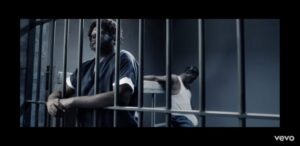Welcome:
Hi and welcome to part three of my analysis of one of the last century’s most influential and densely pact albums. If you haven’t already, check out part one and part two. But now, we move on to the track “These Walls” to uncover the great significance and beauty behind the song.
“These Walls”:
Kendrick Lamar’s “These Walls” starts out as a physical intimacy track but grows into much deeper explorations. Ones of deep power, revenge, and inner conflict. His “walls” are multi-layered. They are first used as metaphors for a woman’s body, then as metaphors for emotional ones, and finally as metaphors and symbolism for prison walls and the certain consequences of previous bad behavior.
Temptation:
First, there is a repeated line of “If these walls could talk” leading into the song’s core. Kendrick then raps “If these walls could talk, they’d tell me to swim good”. This is likely a reference to Frank Ocean’s song Swim Good. The song is about escaping pain and past mistakes. This symbolizing the walls (which are full of guilt, pain, and resentment) will drag him back down and essentially drown him. Then, he arrogantly, yet confidently, rejects the idea of help. He raps “No boat, I float better than he would” continuing with “No life jacket, I’m not the god of Nazareth”.

The latter of the two lines expresses that Kendrick knows he is not Jesus. He isn’t perfect and still falls to temptation and sin. Kendrick then raps, “But ya flood can be misunderstood,” suggesting that people may view the “flood” of consequences as mere punishment, missing the deeper lesson it serves to teach.
Sex, Struggle, and Hurt:
Next, still early on in the song, Kendrick delves into his encounter with a woman. He is telling us he’s not simply feeling pleasure. He is trying to get into her head, her vulnerabilities, and her intentions with him. Specifically, the use of the word “interrogated” tells us that something more is happening than simple desire. It is evident Kendrick is seeking something, either in her or in himself.
Kendrick also expresses a sense of insecurity in the first verse, recalling times when women were not attracted to him. The reference to “walls wanting to cry tears” likely represents both emotional hurt and another symbol of the female body. At the same time, the song starts building up to the emotional vulnerability of the woman. This hinting that their experience is not all about lust, but maybe some way of coping for the two of them.
Biblical Allusions and Fame’s Strangulation:
Throughout the song, Kendrick uses religious symbolism, in this case, the Walls of Jericho, a biblical story where faith made walls collapse. Kendrick applies this to his life, believing that divine intervention and favor helped him overcome his dysfunctional childhood. The “knocking these walls down” line has multiple interpretations. Ones of his emotional walls crumbling, the collapse of personal control, and his break past lust.

There’s also the parallel with the music business here. Finally famous, Kendrick feels overwhelmed by his success, wondering if the life he struggled for is damaging and suffocating him. He’s wondering how long he can continue before his vices overwhelm him, a theme that runs rampant throughout To Pimp a Butterfly.
Revenge Through Intimacy:
Halfway through the song, it is made clear that the woman that Kendrick is interacting with is the girlfriend of the man who killed his friend. This now turns the entire song and overall situation into a mission of revenge. It’s not about pleasure anymore; it’s about control.
Kendrick’s demeanor shifts as he begins speaking indirectly and metaphorically to the man who is behind bars for murder. He starts equating the bedroom walls with the walls he now faces in prison. While Kendrick is technically with the man’s girlfriend, his true, sinful intention is to make the killer know about it and emotionally hurt him. Destiny and fate also play a role here as Kendrick tells the man that his actions have predetermined his destiny and that his downfall is inevitable.
The snitch archetype also arises as Kendrick references notorious snitch Sammy the Bull Gravano. Here he is contrasting the captive man’s decision to cooperate with authorities with an act of betrayal. In prison, people fear a snitch, and Kendrick shows that the man now lives in fear, with limited finances and isolation.

The Walls of Regret and Reflection:
As the song comes to a close, Kendrick brings it full circle, having discovered from his “investigation” of the woman that she was with someone whose deeper realities he has uncovered. The “walls” now represent the man’s mind induced prison. His guilt, his regret, and the pain of knowing that Kendrick used his own girlfriend as a tool of vengeance haunts him. Kendrick also wonders about karma. The man may have gotten away with murder, but his fate caught up to him in a different way through Kendricks “power full of resentment”. The second half of the song darkens and becomes more melancholy.
Kendrick’s Cycle of Power and Pain:
In the end, “These Walls” is not so much a song about lust. The song is about how power and revenge can trap people in a cycle of pain. Kendrick starts strong, using his popularity and fame to get revenge on someone from his past. But as the album progresses, it becomes clear that even though he wins, he remains haunted by his emotions. The walls Kendrick thought he was breaking down may be rebuilding themselves in a new form. He believes they are trapping him in his own mind. “These Walls” starts as a track about physical intimacy but evolves. It goes into deeper exploration of power, revenge, and inner conflict. He uses his “walls” as multi-layered metaphors. Initially for a woman’s body, then for emotional ones, and finally for prison walls and the inevitable consequences of bad intentions.

The Endless Struggle for Redemption:
The song ends with a spoken poem, repeating Kendrick’s original confession of moral turmoil. He admits his misuse of power and rage, which led to intense depression, highlighting the emotional damage his actions caused. The final line, “Found myself screaming in a hotel room,” symbolizes his vulnerability and emphasizes the lasting impact of his struggles. This ending reminds us of recurring guilt and self-doubt. It shows that Kendrick’s battle with his flaws is very much still ongoing.
Tune in for Part Four:
I hope you have enjoyed my analysis of this immensely meaningful, story-telling song. Be ready for part four, where I will analyze the song “U”. This is one of Kendrick’s most dark and vivid songs, uncovering his fatal flaw and inner turmoil. I hope you are eager to learn more about this amazing album and the hidden messages within it!
